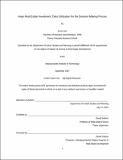Asian real estate investment : data utilization for the decision making process
Author(s)
Huh, Keun, S.M. Massachusetts Institute of Technology
DownloadFull printable version (415.9Kb)
Other Contributors
Massachusetts Institute of Technology. Dept. of Urban Studies and Planning.
Advisor
David Geltner.
Terms of use
Metadata
Show full item recordAbstract
Many investors in developed countries believe the Asian emerging market to be highly risky due to numerous uncertainties including limited market information to make sound investment decisions. However, still successful investment deals were completed by many investors who are already in such markets, and how those investors make sound investment decisions is in need on explanation. Therefore, this thesis explores institutional real estate investors' behavior on entrance to Asian emerging markets, their investment decision making process, and data utilization within each process. Through 14 qualitative in-depth interviews with key institutional investors in the U.S. and Korea, investment decision making processes and data utilization behaviors are examined and summarized in a generalized format. Interview results indicate that an initial entrance to Asian emerging markets occurs rather through a passive introduction of a potential deal by third party than an active search for a target deal by the investor. Also, the general decision-making process for real estate investment starts from sourcing and sorting, followed by review of a potential deal, primary investment committee meeting, due diligence, secondary investment committee meeting, and close of the deal. Each stage of the decision-making process is highly interconnected with simultaneous communication among responsible teams and the investment committee. The Korean real estate market, at least for the office sector, has such abundant market information available that it is rather perceived as "emerged." Investors also have extensive experience in the market and use their market knowledge and third party information as a reference point to verify the deal information. However, they also physically collect market data and use their own internal transaction record when necessary. Furthermore, data utilization in Korea is found to be easy and convenient especially when combined with extensive market experience and a wide professional network in the industry.
Description
Thesis (S.M. in Real Estate Development)--Massachusetts Institute of Technology, Dept. of Urban Studies and Planning, 2007. This electronic version was submitted by the student author. The certified thesis is available in the Institute Archives and Special Collections. Includes bibliographical references (leaf 38).
Date issued
2007Department
Massachusetts Institute of Technology. Department of Urban Studies and PlanningPublisher
Massachusetts Institute of Technology
Keywords
Urban Studies and Planning.